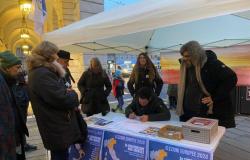The people of Bari choose not to change, renewing the government pact with the centre-left which has now lasted for twenty years. Thanks to Vito Leccese, machine man of the Municipality of Bari during the long seasons of the mayors Decaro and Emiliano, a demerit of the center-right which once again failed to meet the administrative elections. The mayoral candidate Fabio Romito has only one fault: having accepted a designation which came with culpable delay from a coalition that seemed undecided about everything and only after having wasted a lot of time – evidently precious in the face of adversaries so firmly in power – in search of we don’t know who. Romito fought as best he could, bringing the enthusiasm of his 36 years to an electoral campaign that was not an affair for young people, as demonstrated by the average age of the attendees of rallies and events and by those few – fewer and fewer – who they ventured to the polls. And also suffering, three days before the vote, the indigestible gift of differentiated autonomy.
The task that awaits Vito Leccese, a man of certain competence, is not simple. And not because it is objectively complex to administer a city of almost over 320 thousand inhabitants but because Bari will be called upon to resolve two issues: the first is the one relating to the hypothesized mix between the mafia and public administration, the second instead is linked to the over one billion investments obtained, potentially capable of changing the face of the city.
While awaiting the outcome of the work of the access commission on the alleged influence on the Municipality (and on the subsidiary Amtab) carried out by some clans, a clean-up operation must be carried out in line with what was indicated by the judiciary which, with respect to the public transport company, considered the remedies adopted so far are insufficient.
Compared to the amount of planned public investments, it is necessary to ensure that they serve to remove the main critical issues – first of all the complicated relationship between the urban fabric and the railway – and to make Bari a welcoming city again which it no longer is today due to the price of real estate, a story that everyone talks about without anyone taking the trouble to propose concrete solutions to those who – for example – are currently looking for a bed for their child to enroll in university.
Concrete facts, in short, which the new mayor will have to deal with, launching a government team capable and representative of the entire broad field that ultimately supported him. Leccese will not have to commit to making Decaro forget – impossible – but will have to do his part, perhaps further away from social media and communication agencies and closer to the problems, needs and desires of the people of Bari.
Adriana Poli Bortone won – barely but she won, having returned by popular acclaim as mayor of Lecce, at the end of a challenge full of twists and also real low blows with the outgoing Carlo Salvemini: he is not there nothing was spared, not even a queue of electoral meetings on the day of silence, exposed to the Prosecutor’s Office and threats to journalists. The success of Poli Bortone represents the victory of experience and constitutes for the centre-right the foothold on which to find a safe haven in view of the next regional elections. From Salento itself, bad news arrives for the Democratic Party and its allies. The centre-right not only took Lecce despite the efforts of the Emilianist councilor Delli Noci but also conquered Copertino, the historic fiefdom of the regional councilor Sebastiano Leo whose brother was the centre-left mayoral candidate. Lecce lost yesterday, Brindisi lost last year, Taranto lost, the centre-left reconfirms itself in Bari but sees its opponents now upon us, an alarm bell which if not heeded could constitute a serious problem. The adage states that whoever governs Bari, governs the Region; but then if whoever governs Bari governs “only” Bari, then things change, or at least they could.
In Potenza, however, the centre-left managed to overturn the forecast, rediscovering the unity lost in the first round and in the very recent regional elections which had seen the reconfirmation of governor Bardi.
Unity is not always enough but sometimes, like in Potenza, it can make the difference.





